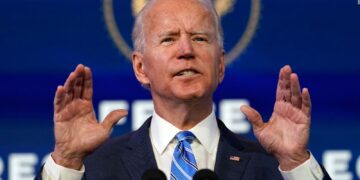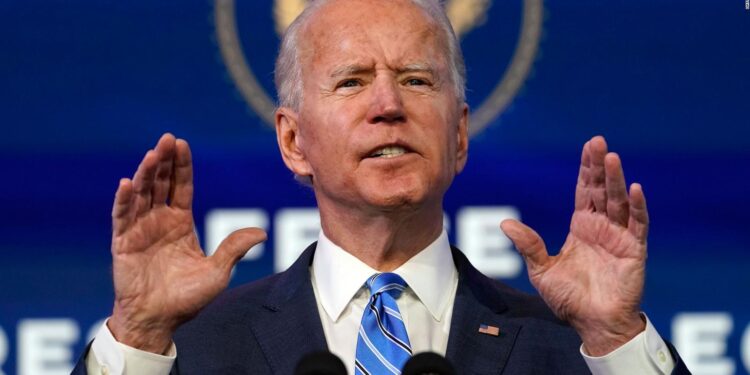The Number Is 81
Late Wednesday in Washington, President Joe Biden ascended the stairs of Air Force One amid temperatures around 100 degrees, en route to his Delaware beach home for a long weekend in isolation following a positive COVID-19 test. Not only is Biden contending with the sweltering heat, but he is also under pressure from party leaders—Senate Majority Leader Chuck Schumer, House Minority Leader Hakeem Jeffries, and Speaker Emerita Nancy Pelosi—who suggest that stepping aside for the good of the Democratic Party might be his best course of action, presumably to allow Vice President Kamala Harris to contend with Donald Trump in the presidential race.
Following a challenging debate with Trump and declining poll numbers, coupled with the fact that at 81, he is the oldest person to hold the highest office in U.S. history, Biden’s prospects for a second term appear slim. Despite his hard-fought campaign to become president and passing more bipartisan legislation than any president since Franklin Roosevelt, Democrat or Republican, Biden must confront the reality that, despite being an effective leader, his age is perceived as a significant issue.
Biden Has Accomplished More Than Any Other President Since FDR
The comparison of Biden to FDR is apt, as both age and health were significant factors in their presidencies’ final years. Like Biden, Roosevelt assumed the presidency when the economy was on the brink of collapse and public morale was low. FDR took bold steps to change direction, not only rescuing the nation’s banks in his first week but also facilitating the passage of 15 major pieces of legislation within his first his first three years in office, laying the groundwork for the New Deal. Remarkably, on one occasion, his administration introduced a significant bill, the Emergency Banking Relief Act, in the morning and saw it enacted by the end of the day.
Amidst the lethal COVID-19 pandemic, a faltering economy, looming climate threats, and escalating racial tensions, Biden assumed office facing the gravest array of crises since Roosevelt, with only a slim Democratic majority in Congress. Nevertheless, he swiftly asserted control, fulfilling his vaccine distribution pledges, implementing a substantial economic relief package, initiating America’s re-engagement on climate change, championing racial justice, and repairing strained relations with NATO, as well as Middle Eastern and Indo-Pacific allies.
The challenge Democratic leaders face in persuading Biden to step aside stems from his success and ability to collaborate with Republicans to accomplish meaningful legislation. If Biden were less successful, it would be much simpler to justify removing him from the top of the ticket.
But everything keeps coming back to the number 81 and despite being a successful leader, it is Joe Biden’s age that has Democratic voters, lawmakers, and party fundraisers worried he may not be able to defeat Trump. Fairly or not, while Trump, at 78, occasionally struggles with mixing up names, lapses into nonsensical riffs, and forgets topics mid-sentence, it is Biden who receives the majority of national press scrutiny.
So How Does Biden Go From President To Statesman
Conversations with individuals from Biden’s campaign suggest he is reconciling with the notion that, despite his effective leadership, it might serve the party and his legacy better if he were to step aside and endorse Vice President Harris, who is 58, as his potential successor. If Biden chooses this route, it would reinforce his long-standing practice of prioritizing the country over partisan politics, a principle that has established him as a highly esteemed figure in Washington, earning admiration from even those Republicans who might oppose his policies but respect him as a person.
This could be the manner in which Biden transitions from president to statesman. He might hold a press conference to declare that he will not pursue his party’s nomination for a second term. Subsequently, Biden would likely endorse his Vice President Kamala Harris as the woman to carry forward their political agenda.
The former leading prosecutor, then U.S. Senator and now Vice President, has focused on publicly criticizing Trump after the debate. She highlights the reasons voters should view him as a danger to democracy and women’s rights. At the same time, she has offered steadfast support for Biden and appears to be the most probable successor.
There Could Be Drama At The Democratic National Convention
As the Democrats approach the August national convention, Biden has secured the party’s nomination. However, party rules prohibit a direct transfer of his accumulated delegates to another nominee. The majority of Biden’s delegates have pledged their support to Harris, making her the frontrunner.
With Harris at the forefront of the ticket, it should reduce potential turmoil and avert floor disputes that lead to enduring damage. Biden would serve as Harris’ senior advisor, easing worries about staffing a cabinet or essential positions in her prospective administration.
A Democratic National Convention in Chicago, celebrating the achievements of President Biden and looking forward to a potential Harris administration, could invigorate the party. Concurrently, Harris would be considering a running mate, with Pennsylvania Governor Josh Shapiro leading the list, followed by Illinois Governor J.B. Pritzker, California Governor Gavin Newsom, North Carolina Governor Andy Beshear, and Transportation Secretary Pete Buttigieg, among other potential candidates.
Can Harris Do Better Than Biden?
Harris has been performing in polls better than Biden in a matchup against Trump, the Republican candidate, though it would remain a close race. An early July CNN poll showed voters prefer Trump over Biden by a margin of six percentage points, 49% to 43%. Similarly, Harris is slightly behind Trump, at 47% to 45%, which is within the poll’s margin of error.
The data also indicates that independents support Harris over Trump by a margin of 43% to 40%, and moderate voters from both parties favor her 51% to 39%. Following the televised debate between Trump and Biden, a Reuters/Ipsos poll showed Harris and Trump in a tie, with 43% for Harris and 43% for Trump
Harris American Jewish Connections Are Strong.
Much attention has been given to former President Trump’s daughter, Ivanka, who converted to Judaism prior to her marriage to Jared Kushner, an Orthodox Jew, and together they have three children. Conversely, little attention has been drawn to the fact that President Biden’s three surviving adult children have all married Jewish spouses, making him the grandfather of seven Jewish grandchildren. (Biden’s first wife and infant daughter tragically died in a car accident in 1972.)
As for Vice President Harris she has maintained a longstanding relationship with the Jewish community. She went to a high school in Montreal that had a significant number of Jewish students and, during her childhood, raised funds for the Jewish National Fund. As the District Attorney of San Francisco in the early 2000s, she formed one of the nation’s first hate crimes units, and later, as the Attorney General of California, she focused on fighting antisemitism.
When Harris married Doug Emhoff in 2014, she fondly recalls the warm welcome she received from her Jewish in-laws, Michael and Barbara Emhoff, who affectionately nicknamed her “Momala” in Yiddish. During her 2017 visit to Israel, Emhoff joined Harris, which featured a Shabbat dinner hosted by solar energy executive Yosef Abramowitz and his wife, Rabbi Susan Silverman.
In presidential elections, Jewish Americans predominantly support the Democratic Party, a series of recent polls average show 67% of Jewish voters favoring Biden over Trump’s 24%. Those same polls suggest Jews prioritize democracy and abortion rights as key issues, and Harris crushes Trump in those areas. The presence of a woman in a leading position is also expected to energize the Jewish Democratic voters, who have increasingly championed women’s roles in political activism and community leadership.
Harris Has Championed And Supported Biden’s Israeli Policy
This week, Israeli Prime Minister Benjamin Netanyahu will be in Washington to address a joint session of Congress on Wednesday. Additionally, he will meet with President Joe Biden at the White House and is expected to have a separate meeting with Vice President Harris, who is also anticipated to meet with the Israeli leader.
The relationship between Netanyahu and Harris remains unclear, yet it is anticipated that they will address the ongoing conflict with Hamas and potentially the vice president’s earlier meeting in March with ex-war cabinet member Benny Gantz. Moreover, the prime minister has recognized the vice president’s outspoken demand for global denunciation of Hamas’s actions on October 7, 2023, particularly the attacks on women, and her firm confrontation of the United Nations over their tepid response to the employment of sexual violence in Israel as a war crime.
Meanwhile, Harris spearheaded President Biden’s Democratic National Campaign Platform, which bypassed the party’s far-left faction. In the president’s words, it guaranteed that the Democrats “are in lockstep with Israel, full stop.” The Party now includes a section of the platform that aligns more closely with the actions of the Biden-Harris administration.
The Middle East portion of the 2024 platform is significantly more comprehensive than its predecessor, dedicating considerable attention to the current Israel-Hamas conflict. Biden’s tenure provides a substantial record, and the platform allocates space to detail the policies he has implemented. It starts by emphasizing the President’s initiatives to deepen Middle Eastern integration, aimed at strengthening the coalition against Iran.
Harris has played a pivotal role as a key surrogate for Biden, contributing to the White House’s efforts to expand the Abraham Accords with a normalization agreement between Israel and Saudi Arabia. There is also hope for a ceasefire deal between Israel and Hamas, potentially resolving the hostage situation before the end of July.
In a recent speech in Pennsylvania, Harris declared, “We hold the belief that a robust, secure, and democratic Israel is crucial to the interests of the United States. Our commitment to Israel’s security, its qualitative military edge, its right to self-defense, and the 2016 Memorandum of Understanding (which includes $3.8 billion in security aid) is unwavering.”
The Trump Camp Would Have Problems With Harris
If the Democrats unite behind Harris, she could strongly appeal to the crucial demographic of women and independent voters on key issues. As a former prosecutor, her ability to articulate the campaign’s message could pose a challenge for Trump, who has been criticized for a lack of focus, a concern even acknowledged by his own team at times.
Since the Supreme Court overturned Roe V. Wade, the constitutional right to abortion in 2022, Harris has emerged as the leading voice on reproductive rights within the Biden administration. This issue is central to the Democrats’ strategy for the 2024 election. Her nationwide campaigning has been notably effective, attracting large and enthusiastic crowds.
While the Trump team maintains they are not daunted by Harris, supporters argue that the proactive attacks on the vice-president — the most senior woman in American politics and the first Black and Asian American to hold the office — signify her potency, especially at a time when doubts about Biden’s capacity to serve have cast her into prominence.
The Trump team is apprehensive about competing against Harris, as the America of 2024 differs significantly from that of 2016. This nation has witnessed the events of 2016 and their consequences. Voters who anticipated the election of Hillary Clinton as the first female president were deeply affected by her defeat, an event that led to the Women’s March, the #MeToo movement, and elections that resulted in a historic number of women in office.
In subsequent years, American voters observed the rollback of women’s rights by decades, and in some states, to a period before women had the right to vote, by unaccountable far-right Supreme Court justices, three of whom were nominated by the man whose profound misogyny overshadowed Clinton, the woman who was once close to becoming the first female president.
Voters concerned with women’s rights are acutely aware of the stakes; we understand, more profoundly than in 2016, the impact of confronting America’s longstanding glass ceiling. Let’s be candid: Harris is significantly more intelligent, politically astute, and by all accounts a superior candidate compared to Trump.
Harris challenges the legacy of 248 years of male leadership in the U.S., presenting a gamble for the Democrats, yet she may also represent their strongest chance at triumph in 2024. Trump is considered the favorite in a contest against Harris, but it promises to be a monumental clash.
Washington based CEO & Founder of LJC. Media covering politics, sports, & entertainment A seven-time Emmy Award-winning TV producer, director, and podcast host. Digital Director and Washington Bureau Chief at News Talk Florida & The Daily Cable























































